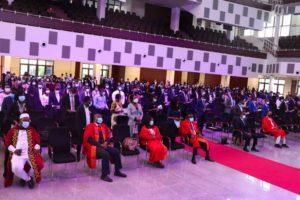UPSA admits 883 postgraduate students for 2020/2021 academic year
 The University of Professional Studies, Accra (UPSA), has admitted 883 postgraduate students to pursue various second degree and Doctor of Philosophy (PhD) programmes for the 2020/2021 academic year.
The University of Professional Studies, Accra (UPSA), has admitted 883 postgraduate students to pursue various second degree and Doctor of Philosophy (PhD) programmes for the 2020/2021 academic year.
They include 25 PhD students, 31 Master of Philosophy (MPhil), 658 Master of Business Administration (MBA), 143 Master of Arts/Master of Science (MA/MSc) and 26 MBA (by distance learning) students.
The postgraduate registered fresh students comprise 508 males (57.53 per cent) and 375 females (42.47 per cent).
Professor Abednego Feehi Okoe Amartey, Vice-Chancellor, UPSA, who made the disclosure on Friday at the matriculation of the University’s fresh postgraduate students in Accra, noted that the male to female ratio was 6:4.
“This year’s intake represents about 26.87 per cent increase over that of the previous year,” he said.
He explained that the matriculation ceremony should have been held at the later part of last year but had to be rescheduled due to the COVID-19 pandemic.
The Vice Chancellor urged all and sundry to play their part in the fight against the virus by adhering to all COVID-19 prevention protocols – wearing of masks, social distancing and frequent hand washing with soap or sanitizing.
With regards to blending teaching and learning, Prof Amartey said as part of measures to curb the spread of the coronavirus, Management of the University had decided that teaching and learning during the 2020/2021 academic year should be delivered through blended teaching and lending.
In other words, the normal in-person instructional method which spans a period of 13 weeks per semester would now be divided into two.
He said during the first six weeks, there would be in-person or face to face teaching with double contact hours per week, adding that this would be followed by another six weeks of online or virtual teaching.
He said there would, of course, be one week of revision; thus the 13th week would be devoted to revision.
Prof Amartey said the end of semester examinations would largely be held in-person with examinations for some few courses taken online or as take-home assignments.
Concerning new academic programmes, the Vice Chancellor said they would be matriculating the first batch of students who had been enrolled onto the MSc in Insurance Risk Management Programme soon after having received accreditation to mount the programme last year.
He said the University had received approval for the introduction of MSc in Procurement Management programme, which would take off next academic year.
Regarding infrastructure development projects, Prof Amartey said: “In spite of all the challenges brought about by the (COVID-19) pandemic, all the new infrastructural development projects initiated in 2019 are progressing according to schedule.”
“This includes the two hostel buildings – which will house 812 students – and the multipurpose, twin tower building, which will comprise commercial, office and lecture rooms”.
He said there was also a challenge of shortage of accommodation for their graduate students, leaving many of them at the mercy of private hostel owners.
“We understand the specific needs of our graduate students, and I am happy to inform you that the University has purchased property behind this auditorium, which will be converted into a postgraduate hostel.”
On free wifi project, he said the UPSA had been selected as one of the 13 public tertiary institutions benefitting from Government’s Free Wifi Project in the amount of $514,000, for the improvement of campus internet connectivity.
This project, he said came at an opportune time when online teaching and learning had become the order of the day in the wake of the pandemic.
Prof Amartey urged the freshmen to honour the tenets of the matriculation oath and to be guided by the University’s rules and regulations.
Dr Kofi Ohene-Konadu, the Chairman of the UPSA Council, advised the students to take their studies serious, saying “that is the essence for enrolling at UPSA, anything else is secondary”.
He also urged them to take personal hygiene and health matters very serious, especially in the face of the COVID-19 pandemic.
Source: GNA
